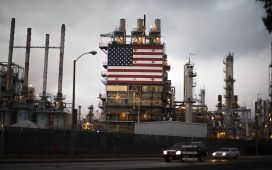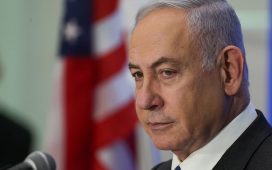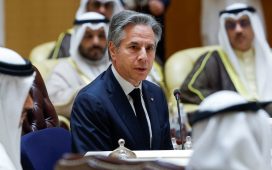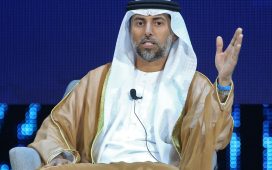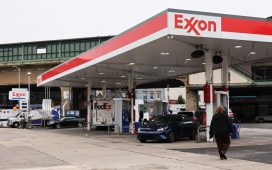Paul Gregory, Professor Emeritus, Department of Economics

dpatop – 11 September 2020, Mecklenburg-Western Pomerania, Mukran: Manuela Schwesig (SPD, M), the … [+]
Trying to figure whither Nord Stream 2 (hereafter NS2) – the undersea gas pipeline from Russia to Germany – is akin to solving five complicated jigsaw puzzles at once. Competing interests, changing legal foundations, and momentum all make it difficult to either start or stop. One thing is certain: Russia is playing a long game from which it will not retreat until NS2 becomes operational.
At 95% complete and 11 billion Euros out of pocket, the NS2 consortium, comprised of Russia’s state-owned natural gas monopoly (Gazprom) and German, Austrian, and Dutch utility giants, seemed poised to enter into service by early 2021. The Trump administration had already played its sanction card to the limit, and there were just a few regulatory issues to be ironed out.
That was before the “attempted murder” (to use Angela Merkel’s characterization) of Russian opposition leader Aleksei Navalny on August 20 over East Siberian skies. The Navalny case, piled on top of Russian hacking of the German Bundestag and a blatant political assassination on the streets of Berlin, raised German voices in favor of stopping NS2.
European leaders understood that the rising count of murders of Russian political opposition figures had to be approved (or not objected to) by President Vladimir Putin himself. In Navalny’s case, the physical evidence was clear: German medical experts concluded Navalny had been poisoned with a banned nerve agent used in past assassinations of Russian opposition figures. The German finding was confirmed by French and Swedish labs.
The Navalny poisoning, therefore, raised the question: Do Germany and the rest of Europe really want to be energy dependent on a rogue regime that routinely engages in state murder?
The EU and NATO reacted with outrage as the facts of the Navalny poisoning became clear. The Navalny case elicited demands for a “transparent” investigation, but all parties realized that no investigation would be allowed to reach into the highest levels of the Kremlin itself. Anger intensified when the Kremlin claimed the attempted murder was a false flag operation to embarrass Russia, that Navalny poisoned himself (as Putin suggested to France’s Emmanuel Macron), or that Germany’s renowned Charite Hospital had misdiagnosed what was a case of food poisoning.
With each preposterous Russian claim, voices were raised that the Kremlin should pay a real price, which brings us to Germany and Nord Stream 2:
In 2010, Germany passed the Energiewende (Energy transformation), which called for 90% CO2 reduction and 60% renewable energy by 2050. These benchmarks were to be achieved by phasing out nuclear and coal and switching to wind and solar.
As Germany sought to implement its energy transformation, electricity prices soared. To keep German industry competitive the price increases were borne primarily by households. Moreover, the brown-coal industry – a major employer in the depressed Eastern states—had to be phased out, thus shifting votes to Germany’s extreme right and left parties.
Gazprom’s NS2’s projected second Baltic Sea pipeline running directly from Northern Russia to a coastal hub in Germany (which happened to fall in Angela Merkel’s electoral district) was seen as a way to tide Germany over with cheap natural gas as it advanced through its energy transformation. Moreover, NS2 would make Germany the hub of European natural gas by replacing gas transmission through Ukraine.
NS2 has powerful supporters in Germany, Austria, and the Netherlands. Giant utilities from these countries that paid half of NS2’s costs joined Merkel’s coalition partner (the SPD) and far right and left parties as firm supporters of NS2. Opposition came from within Merkel’s own party, notably from two potential candidates to replace Merkel, Friedrich Merz and Norbert Roentchen, and from the Greens, who oppose all forms of carbon energy.
The most vocal opposition to the completion of NS2 came from within the European Union, particularly Scandinavia, the Baltic States, and Eastern Europe, in particular Poland. These opponents feared domination of Europe by Russian gas and the loss of existing pipelines through Ukraine.
Contrary to its posturing as the guarantor of European unity, Germany has supported a key infrastructure project (NS2) opposed by most of its EU partners. When Europe amended its Gas Directive in April 2019 to apply to third countries (like Russia), it appeared that Nord Stream 2 was out of luck. The amended Gas Directive enforced rules of competition, such as the decoupling of transmission and distribution. This requirement would have meant that the state monopoly, Gazprom, would have to divest itself of distribution. There were other onerous requirements such as reserving space for other suppliers and allowing backflow sales that, if implemented, would threaten the economic viability of NS2.
It was Germany that saved NS2 in a last-minute compromise promoted by France that allowed Germany to “monitor” the Gas Directive rules in a sort of fox-guarding-the-henhouse ploy.
On the eve of the murder attempt on Navalny, NS2 lacked some 165 km until landfall. Permitting problems by Denmark seemed resolved, and Russia had brought in its own pipe-laying ship to replace the Swiss vessel frightened off by U.S. sanctions. It seemed that Russian patience had paid off. NS2 would at last be operational by early 2021. Ukraine’s pipelines would fall apart due to low transmission rates, and Russia would solidify its position as the dominant supplier of natural gas to Europe. Scandinavia and Eastern Europe would become even more dependent on Russia.
Enter Navalny and the growing realization that the only meaningful punishment for Putin would be the cancellation or significant delay of NS2.
Merkel’s first reaction was that NS2 is a commercial project that should not be decided by politics. As she came to understand the depth of the European reaction (and entered her final year as chancellor), she punted by proposing to let the European Union decide the fate of NS2.
Punting to the EU had two advantages for Merkel: First, German politics are hopelessly splintered. Two possible Merkel successors have proposed that NS2 be cancelled or delayed. Business interests argue that Russia is a reliable partner, and, after all, Germany does not have particularly clean hands when it comes to international energy dealings. Merkel’s coalition partner, the SPD, has no such qualms. Its upcoming chancellor candidate, Olaf Scholz, stands firmly behind NS2, which he characterizes as a purely commercial project. Former Chancelor Gerhard Schroeder heads the NS2 board, and his SPD opts for good relations with Russia, no matter how bad its behavior.
How is Europe likely to deal with the NS2 hot potato?
With its complicated organizational structure and requirement that major issues, such as sanctions, be decided unanimously, the EU is unlikely to come up with any conclusive decision with respect to NS2, but one thing is sure: The wheels of decision making grind slowly in the EU; so we can count on a long period for the EU to decide that it cannot decide.
The European Energy Charter, signed in 1994 to encourage infrastructure investments in the former Soviet bloc, raises the thorny issue of money. According to the Charter, private investment projects must be compensated if terminated or otherwise harmed by state action. Under the Charter, someone would have to compensate the European utilities and Gazprom for their billion-euro losses.
The smart money would be on NS2’s eventual completion and Russia’s continued domination of the European gas market. Navalny has survived, NS2’s defenders and lobbyists are in full swing. The Trump administration may have run out of sanctions options. The European Union has bigger problems to deal with. With the feeble demand for gas associated with COVID-19, Germany and Europe can take their time as Russia pulls out all stops in its defense of NS2.
NS2 will be completed. The only question is the duration of the delay.
Paul Gregory is a research fellow at the Hoover Institution. He is Cullen Professor Emeritus in the Department of Economics at the University of Houston, is a research fellow at the German Institute for Economic Research in Berlin, and is emeritus chair of the International Advisory Board of the Kiev School of Economics. Gregory has held visiting teaching appointments at Moscow State University and the Free University of Berlin. Gregory was the director of the Russian Petroleum Legislation Project of the University of Houston Law Center from 1992 to 1997 and has written broadly on Russian energy.
The holder of a PhD in economics from Harvard University, he is the author or coauthor of twelve books and more than one hundred articles on economic history, the Soviet economy, transition economies, comparative economics, and economic demography. His most recent books are Women of the Gulag: Portraits of Five Remarkable Lives (Hoover Institution Press, 2013), Politics, Murder, and Love in Stalin’s Kremlin: The Story of Nikolai Bukharin and Anna Larina (Hoover Institution Press, 2010), Lenin’s Brain and Other Tales from the Secret Soviet Archives (Hoover Institution Press, 2008), Terror by Quota (Yale, 2009), and The Political Economy of Stalinism (Cambridge, 2004), which won the Hewett Prize. He co-edited The Lost Transcripts of the Politburo (Yale, 2008). His archival work is summarized in “Allocation under Dictatorship: Research in Stalin’s Archive” (Journal of Economic Literature.) Gregory is the producer working with director Marianna Yarovskaya of the documentary film Women of the Gulag, short listed in the 2019 Oscar competition.
UH Energy is the University of Houston’s hub for energy education, research and technology incubation, working to shape the energy future and forge new business approaches in the energy industry.
